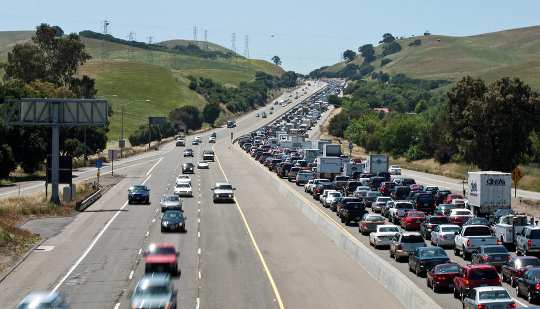
Much of the U.S. was built around the automobile, with greater distances to be covered than in places like Europe, making Americans' daily lifestyles higher in energy than elsewhere.
Every morning I awake torn between a desire to save the world and an inclination to savor it. This makes it hard to plan the day.
This thought, by author E.B. White, captures the tension that every advocate for action on climate change should feel. This is especially true for those of us who do research and who are most knowledgeable about the problem and the role our lifestyles play in creating it.
George Marshall, in his book Don’t Even Think About It, describes the inner conflict, depression and guilt that many scientists feel “as they struggle to square what they know about the impacts of high-carbon lifestyles with the pressure to conform to a society where those lifestyles are not just encouraged but also often required as a mark of social belonging.”
This is a real concern for external legitimacy as well.
Wired magazine in 2015 reported that the Paris COP21 Climate Talks emitted about 300,000 tons of CO2. The irony is dripping from that statistic, which is not unlike the revelation in 2006 that Al Gore’s home consumed 191,000 kilowatt-hours, considerably more than 15,600 kilowatt-hours used by the typical Nashville house.
In both cases, the excessive emissions were offset by Certified Emission Reductions or renewable energy. And in both cases, the sarcastic snickering was not assuaged, feeding ongoing criticism for those whose actions do not seem to match the urgency of their words.
One need not look far to find the litany. “Hypocrites in the air” claims one blog post. The comments section of another article called “Climate activist: Flying to conferences lacks integrity” rips “any climate ‘activist’ who isn’t absolutely at home on Webex and GoToMeeting is a complete phony,” and “they should be living entirely ‘off the grid’ if they truly walked the talk.”
Now certainly, those who care about climate change need not live in caves and wear hair shirts before their message is taken seriously.
But there is a kernel of truth in the critique. If climate change is so serious, why are we not at least trying to change our lifestyles? We need some degree of authenticity that matches the urgency of what we know about this issue. Shouldn’t we be mindful about our lives and the ways in which they contribute to the problem, lest we be seen as arrogant (Our work is so important that it outweighs the impact of our lifestyles) or apathetic (We are scientists and our contribution is science, not politics or social change)?
As we consider this next step, we need to do it without judging others, without judging ourselves and with a clear awareness that individual action alone will not create the kinds of changes in technology, culture and behavior that will be at a scale necessary to address this global problem. And yet, we should still try.
Don’t judge others
We are all human, with our own ambitions and foibles, strengths and weaknesses, opportunities and constraints. And we all develop justifications for the decisions we make. We might tell ourselves that our individual actions don’t matter and that it is up to governments to solve this. Or we may tell ourselves that we need to do this; we’re not hurting anyone, everyone else does it or other people are far worse. We all have ways of developing self-serving narratives. No one is immune, especially when we don’t know how to easily live carbon-neutral lives.
Some use the analogy of addiction to describe our high-carbon lifestyles. We are addicted to oil, travel, consumption, etc. But I never liked this analogy as it can create judgments that make people defensive, setting up the problem as “us versus them.”
 Americans consume many times more energy per capita than any other country. Large homes and a lot of driving help explain why. therefore/flickr, CC BY-NC-NDAddiction (typically related to drugs or alcohol) is an illness that is an aberration from the norm. We know what is healthy behavior and we know what is not, because some people are addicts and some people are not. But on the issue of climate change, we are all faced with the same challenge. In a sense, we are all addicts with the same malady, and there are no healthy people we can look to in order to gauge normal behavior.
Americans consume many times more energy per capita than any other country. Large homes and a lot of driving help explain why. therefore/flickr, CC BY-NC-NDAddiction (typically related to drugs or alcohol) is an illness that is an aberration from the norm. We know what is healthy behavior and we know what is not, because some people are addicts and some people are not. But on the issue of climate change, we are all faced with the same challenge. In a sense, we are all addicts with the same malady, and there are no healthy people we can look to in order to gauge normal behavior.
I think a better analogy is a collective of people who are lost on a terrain they thought they knew. We know what addiction looks like when it is cured, but a group of people who are lost do not know where to go. What we need are leaders who have a vision for where to go, can model behavior that gets us there, and display empathy for those who are unsure about following. That role falls to all of us.
There is no room for judgment here. In fact, I’ve found that some of the most self-righteous people on the environment tend to draw the line between acceptable and unacceptable lifestyles right where they reside, usually in a scale for Western lifestyles. Might someone from India or Bangladesh agree that any Western lifestyle is a sustainable one? Who is to judge?
Don’t judge ourselves
Just as blaming others for the problem of climate change is not productive, the same is true for self-blame. We must not fall into the trap of feeling inadequate or a fraud based on an expectation of perfection. There are serious limitations to taking individual action on climate change, and we can’t allow the perfect to be the enemy of the good.
Climate change represents a challenge different from other environmental issues like litter or eating a threatened species. Where these are discrete choices, virtually every lifestyle activity (and virtually every manufacturing activity) entails the creation of some degree of greenhouses gases, whether it’s heating one’s home or driving to visit family. The simple truth is that, as Canadian academic and environmental activist David Suzuki points out, “We don’t have the infrastructure to be ecologically neutral.” But he continues,
Right now, the important thing is to share ideas and change minds, and the way I do that is by meeting with people or speaking. Unfortunately, in Canada, that means I have to fly, and flying generates a lot of greenhouse gases. Still, it doesn’t mean that we don’t need to try to minimize our ecological footprint. I did that by trying not to use a car, or when I needed to, I bought the first Prius sold in Canada. We have a rule in our household: if you’re going to work or school, you take a bus or walk. We’ve reduced our garbage output to about one green bag a month, and I think we can reduce it further. But every time I jump in a plane, it negates everything else I do to live sustainably…[We need to acknowledge] that these things matter. We have to at least try because we’re hoping to convince others that they all have to try, too. But there are different levels of contribution each person can make.
And that is the key: each of us has to begin the effort in a way that fits our knowledge, circumstances, convictions and possibilities. We must each start where we are and learn to become aware of our impact, the ways those impacts may be reduced or eliminated, and the challenges with taking action.
Take individual action
Start slow and start realistic. Real and lasting change has to be gradual and careful. Big grand changes, just like big grand New Year’s resolutions, have a habit of failing. Take that first step, not with the goal of changing the world. Instead, start your personal journey with no idea where it will take you.
First, educate yourself. Try a personal carbon calculator, such as this one from the EPA. Learn about your direct and indirect emissions and where they come from from a book or perhaps a class.
Second, explore ways to reduce those impacts in ways that fit your lifestyle demands. Go to the Going Green Checklist for 101 ways to get started, or the EPA’s web page on what you can do to address climate change. Insulate your home, screw in an LED light bulb, recycle your toilet paper roll, change your investment portfolio, change your career, volunteer for an environmental group, buy a programmable thermostat, buy a more fuel-efficient car, buy a bicycle, don’t buy anything at all, think about what you consume! Try giving up meat. If not permanently, try it for a short time, perhaps for Lent (if you are very ambitious, try giving up carbon for Lent). After all options are exhausted, learn about purchasing carbon offsets.
Eco-benefits of staying home
One activity that has garnered considerable attention for behavior change among researchers is to stop going to conferences. While few studies that quantify academic carbon emissions exist, one study in Ecological Indicators found that transportation accounts for 75 percent of the carbon footprint of a Ph.D. student and attending conferences accounts for 35 percent of that carbon footprint.
In response, Professor Kevin Anderson at the University of Manchester took a train to a conference in China, convinced that this added to the legitimacy of his science. Professor Laurie Zoloth, who directs Northwestern’s Center for Bioethics, Science and Society, calls upon scholars to take a sabbatical from academic conference travel every seven years to allow the Earth to rest. In October 2015, a group of 56 scholars from more than a dozen countries launched a petition calling upon universities and academic professional organizations to greatly reduce their flying-related footprints as part of the effort to limit the destabilization of the climate system.
While this may be the answer for some, it may not be for others. For example, colleagues at some smaller colleges need conferences to make connections and gain access to the latest research. In the end, conferences are an important aspect of what researchers do for a living and simply stopping them seems, in my opinion, counterproductive. Instead, be mindful of which conferences you go to and how, and consider the carbon footprint of your lifestyle in its totality before deciding where to act.
In the end, we should not lose sight of what we do best. Do good research; share it with others; speak out on climate change; use that knowledge to vote for politicians who propose action on the issue. And, recognize that we need to also change the system.
How to change the system
Let’s face it; individual actions alone will not solve the problem. They will give us insights on the solutions and a sense of the magnitude of change that is necessary to change our culture of values and behavior. But, the necessary changes must come from a shift in societal norms and market rules. It will require a challenge to the dominant notions of consumerism, shifts in the rules of capitalism and a reexamination of the role of the corporation in society.
If designed properly, policies that address climate change will reduce or even eliminate the impact of individual behavior. For example, Dr. Grischa Perino from the University of East Anglia’s Centre for Behavioural and Experiment Social Science offered a provocative argument that green consumers who voluntarily choose not to take a flight within the EU for environmental reasons will, in fact, have “no impact on total emissions” due in large part to the offsetting of those emissions required by the EU Emissions Trading System. While some criticize the result as being too theoretical and not reflective of the implementation realities, this is what regulations are supposed to do: change the entire system, not just pieces of it.
Some see something sinister in the focus on individual action. Author Murray Bookchin warns that “it is inaccurate and unfair to coerce people into believing that they are personally responsible for present-day ecological disasters because they consume too much or proliferate too readily. … If ‘simple living’ and militant recycling are the main solutions to the environmental crisis, the crisis will certainly continue and intensify.”
Culture and behavior change involves us all
In the end, the challenge of climate change, indeed the broader challenge of living in the Anthropocene, requires a broad-scale shift in our culture. This shift must take place from the bottom up and the top down.
Those of us who care about climate change must model a way, if not solely by action, at the very least by the effort of trying. We need to practice the art of being mindful, thinking and behaving differently than the dominant cultural norms of consumption tell us to think and behave.
We must strive to both advocate and embody a new worldview, one that moves from carbon constrained to carbon neutral to eventually carbon negative. Or, as scholar John Ehrenfeld describes it, shifting from being less unsustainable to being more sustainable. None of us knows how to do this yet.
But, as Pope Francis points out, any effort in the right direction, “however small it may be, opens us to much greater horizons of understanding and personal fulfillment… [and] a greater sense of responsibility, a strong sense of community, a readiness to protect others, a spirit of creativity and a deep love for the land.”
This is the essence of individual action, to strive for a new awareness. We can’t explore this new reality in the abstract. We have to strive for change at the larger scale while also experimenting with changes in our own everyday lifestyles. Eco-authenticity resides in both.
About The Author
 Andrew J. Hoffman, Holcim (US) Professor at the Ross School of Business and Education Director at the Graham Sustainability Institute, University of Michigan. He has published twelve books, which have been translated into five languages. His work has been covered in numerous media outlets, including the New York Times, Scientific American, Time, the Wall Street Journal and National Public Radio.
Andrew J. Hoffman, Holcim (US) Professor at the Ross School of Business and Education Director at the Graham Sustainability Institute, University of Michigan. He has published twelve books, which have been translated into five languages. His work has been covered in numerous media outlets, including the New York Times, Scientific American, Time, the Wall Street Journal and National Public Radio.
This article originally appeared on The Conversation
Related Book:
at InnerSelf Market and Amazon


























